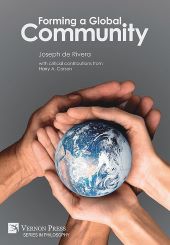Synopsis
To address global problems such as pandemics, warming, economic inequality, mass migration, and widespread terrorism, Joseph de Rivera argues that we must form a global community. A community of eight billion humans is difficult to conceive. However, it can be imagined and created if we transform our understanding of who humans are and what ‘community’ entails. We can understand who persons are, how they are motivated, and how a community can be conceived in a way that offers an alternative to individualism and collectivism. The “mutualism” that is proposed provides a moral compass for navigating the challenges that confront us and encourages specific governing structures, political economies, and rituals that will further the formation of a global community.
Based on the philosophical analysis of John Macmurray, the author’s argument relies on an extensive review of the current literature on self, personhood, emotional motivation, social identity, forms of community, and religious and secular rituals. Interdisciplinary in nature, it aims to direct philosophy and the social sciences to the challenges of globalism and the creation of a global community.
Part of the publisher’s “Series in Philosophy.”






